LGBTQ+ History of The Sims – A Legacy of Storytelling and Design
For the past 25 years, The Sims has been a genre-defining sandbox game allowing players to explore every corner of identity, including sexuality, relationships and gender expression. While many games have lagged when it comes to LGBTQ+ representation, The Sims quietly, and then loudly and proudly, cemented itself as one of, if not the most, queer inclusive franchises in the history of gaming.
From the moment two female Sims shared an autonomous kiss at E3 in 1999, to the introduction of customisable pronouns, unique sexual orientation, and gender identities in The Sims 4, the series has offered players a unique experience in which they can experiment with and celebrate who they are and who their Sims are. The Sims has not only reflected the real-life social progress seen over the first quarter of the 21st century, but it has also helped simulate it and break down barriers in the gaming industry.
Throughout this piece, I will take you through the queer history of The Sims, examining how the game has shaped its community and how the community has, in turn, shaped the game.
Table of Contents
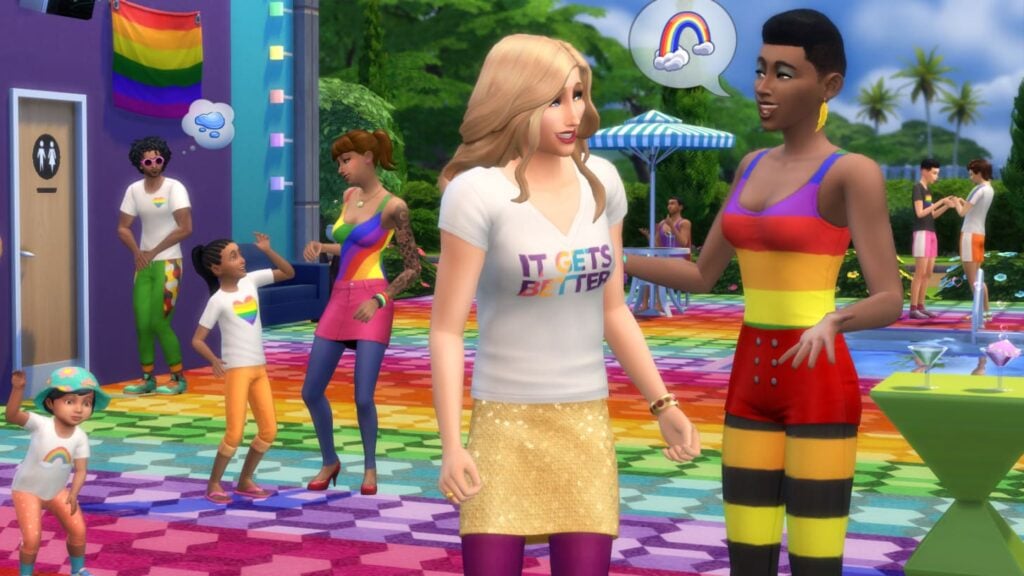
The Sims (2000) – “You Might Say They Stole The Show”
When the first game launched in 2000, few could have predicted just how influential the game would become, even to the surprise of Maxis and EA. Created and helmed by Will Wright and developed by Maxis, the game was unlike anything on the market at the time. Beneath its seemingly ordinary pastiche of American life, The Sims offered something that, for the time, was quite radical.
The inclusion of same-sex relationships is mostly attributed to one of the game’s programmers, Patrick J. Barrett III. Before Barrett joined Maxis, there were extensive conversations about whether same-sex relationships and interactions would be included in the game. After all, the game was meant to reflect all aspects of everyday life in modern America, so why would they not include it? After fearing public and publisher pushback, the team decided to exclude this aspect. When Barrett joined the team in 1998 he was unaware of this decision, so during his supervisor’s short trip away, Barrett worked on the programming for the social interactions in the game all while following the design handbook that pre-dated the decision to exclude queer relationships. No one questioned Barrett’s work, including the creator of the franchise, Will Wright, who was happy to see same-sex interactions reintroduced.
With the game ready to be shown to the public, Electronic Arts showcased it at E3 in Los Angeles in mid-1999. The demo of a wedding scene shown to the public was supposed to be “on-rails”, due to time limitations and the number of Sims in the scene, Barrett didn’t have enough time to control every Sim. This led to the talk of the convention, a same-sex kiss between two female guests at the wedding. This played out in front of a live audience filled with both gamers and press, and soon lines for the demo of The Sims were forming and became the game that anyone and everyone talked about.
“You might say they stole the show” – Patrick J. Barnett III
The New Yorker – “The Kiss That Changed Video Games” – Simon Parkin – June 18th 2014
At a time where video games, and wider media, either ignored or stereotyped queer identities, The Sims offered quiet validation through freedom of choice. It didn’t need to shout about representation – it simply allowed it.
The Sims 2 (2004) – Till Death
With the success of The Sims and its subsequent Expansion Packs, development began on The Sims 2. Similar to its predecessor, there were no labels for sexuality, no storylines that acknowledged queerness in any form, and very few moments in which the game highlighted LGBTQ+ identities. The franchise remained quiet about its inclusive nature, but players knew it was there.
In The Sims 2, same-sex Sims could now perform ‘joined unions’, a feature that mimicked marriage, containing all the same gameplay elements as marriage, the only difference being in name itself. In every practical sense, this was marriage. In many ways this reflected the legal landscape of the mid-2000s, where queer couples were, then more than ever, fighting for the right to marriage equality. The Sims 2 became a place in which players could imagine what a more inclusive world might look like.
The political landscape was shifting. In April of 2001, the Netherlands became the first country in modern history to legalise and recognise same-sex marriage. In the United Kingdom, civil partnerships were given royal assent in 2004, just months after the release of The Sims 2. The future for same-sex relationships and LGBTQ+ representation in the media was looking brighter than ever.
The Sims 3 (2009) – The New Normal
The Sims 3 took things a step further by officially allowing same-sex marriage. At the point of release in 2009, only 7 countries had permitted same-sex marriage nationwide, alongside a handful of US states. Though lacking explicit LGBTQ+ identities, The Sims 3 normalised queer relationships through gameplay, creating a safe space for more authentic storytelling.
Furthermore, if two same-sex sims are married, then the partner will be listed as a ‘co-parent’ to any adopted children. The Sims 3 also introduced same-sex biological children in the Into the Future Expansion Pack. If two Sims in a relationship, regardless of gender, travelled to the hospital in Oasis Landing, they would have the option to engineer a biological baby for §5000.
Fun Fact
The Sims 3 was the first game in the franchise to feature a pre-made same sex couple with the Shear Family from The Sims 3 Roaring Heights Store World. This world also featured the franchise’s first confirmed ‘lavender couple’ with both Sims in the Davies-Welles family having secret love affairs with partners of the same sex.
The Sims 4 (2014) – More Mechanics, More Choice
The Sims 4 released in 2014, and EA and Maxis were willing to take a more deliberate approach into LGBTQ+ representation, moving beyond just same-sex marriage towards activly celebarting queer identnties as a core part of the game.
Two years after launch in June of 2016, Create-A-Sim mode received a huge overhaul, allowing players to meticulously customise a Sim’s gender identity with new options for physical frame, clothing preferences, pregnancy toggle, and even how they interact with a toilet. Voice types were also expanded, allowing Sims to choose any of the 6 voice options regardless of assigned sex. This update allowed players to create Sims who could be considered transgender, nonbinary, genderfluid, or any option they saw fit for the story they wanted to tell.
The evolution continued with the pronouns update in May 2022, letting players select how their Sims are referred to both by the game and by other Sims. In July of that same year, CAS received another huge feature added, sexual preference! Throughout the Sims franchise, the Sims themselves were always considered pansexual by the game and could autonomously fall in love with anyone regardless of gender. With this update, Sims could be straighter than ever with the ability to assign both romantic and sexual orientations and the option for romantic exploration. In 2024, this feature was expanded to allow for more customisation of romantic boundaries, allowing for open relationships and polyamorous Sims.
Inclusivity didn’t just come in the form of gameplay options. We have also received a handful of pride updates, with the most recent allowing for more pride flag options, as well as new clothing and build-buy items that all have a pride theme. The Sims 4 Cats & Dogs Expansion Pack featured the first same-sex couple in The Sims 4 with the Hecking Family.
Despite a cultural and political shift, mostly due to the rise in right-wing media and social media platforms, Maxis and EA have consistently celebrated and supported Pride Month with new additions every year and cementing the Sims as an inclusive space.
The Community – Creators and Storytellers
While The Sims as a franchise has gradually evolved to include more explicit queer representation, it is the community of players that truly make the game what it is; a vibrant, living space LGBTQ+ storytelling and identity. From the earliest days where the game’s systems merely hinted at queer possibility, the players and creators stepped in to fill the games, turning The Sims into much more than just a game.
Mods and custom content (CC) were among the first tools for queer expression. Players have created clothes, Sims, builds, and objects that express who they want their Sims to be. Beyond the modding scene, the community became a safe space for storytelling. Queer legacy challenges, shared on various forums and social media platforms, have allowed players to chronicle their gameplay that focus on coming out, queer living, and individual identity. Platforms such as Tumblr and YouTube became hubs for sharing stories. Many online creators identify as LGBTQ+, and have been platformed by The Sims Team, such as Juno Birch and her wonderfully wacky Sims 2 videos.
Most importantly, the community-led creativity has influenced the official Sims Team, and cues have been taken from what players want and need, incorporating feedback and celebrated identity without prejudice.
In 2023 at the Game Developers Conference, Executive Producer Phillip Ring shared insights into the demographics that make up Simmers worldwide. From this report, we can see that 45% of players identify as something other than strictly heterosexual. 15% of players identify as a label other than cisgendered. This isn’t accidental; Maxis makes a conscious effort in its marketing to engage a diverse audience.
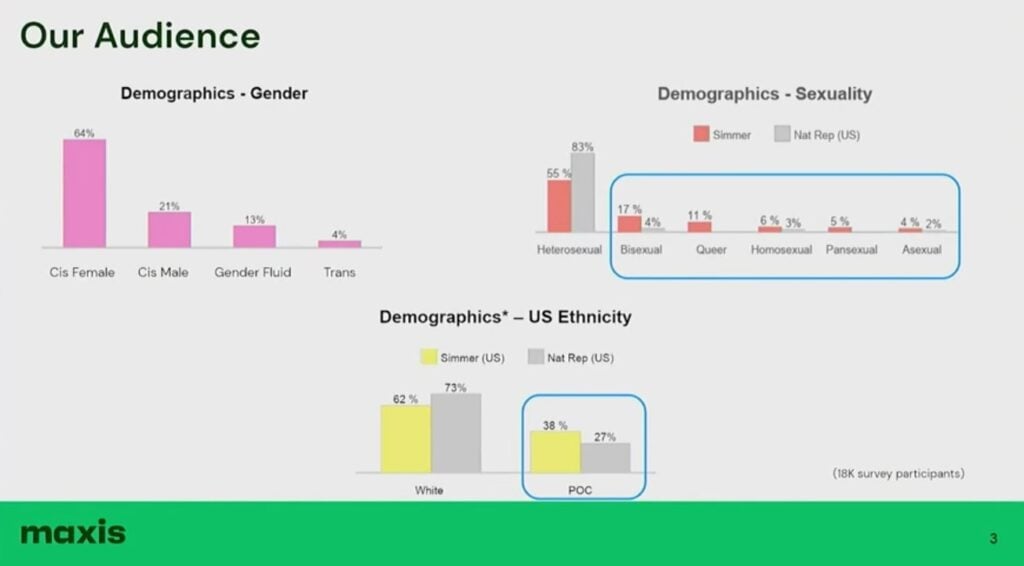
Cultural Impact – A Cultural Touchstone
One of the game’s greatest strengths lies in its open-ended design. Rather than prescribing narratives like most big game franchises, it invites payers to create their own stories, including those that center queer experiences. This freedom has allowed generations of players to experiment with gender and sexual expression in a safe and affirming environment.
For many young people, myself included, The Sims was a crucial tool for self-discovery. Much like the frogs that drink the chemicals in the water, perhaps the Sims “turned me gay”. Probably not, but without it, I wouldn’t have had that space to discover who I truly was, as media in the 2000s was lacking in positive, non-stereotyped inclusion.
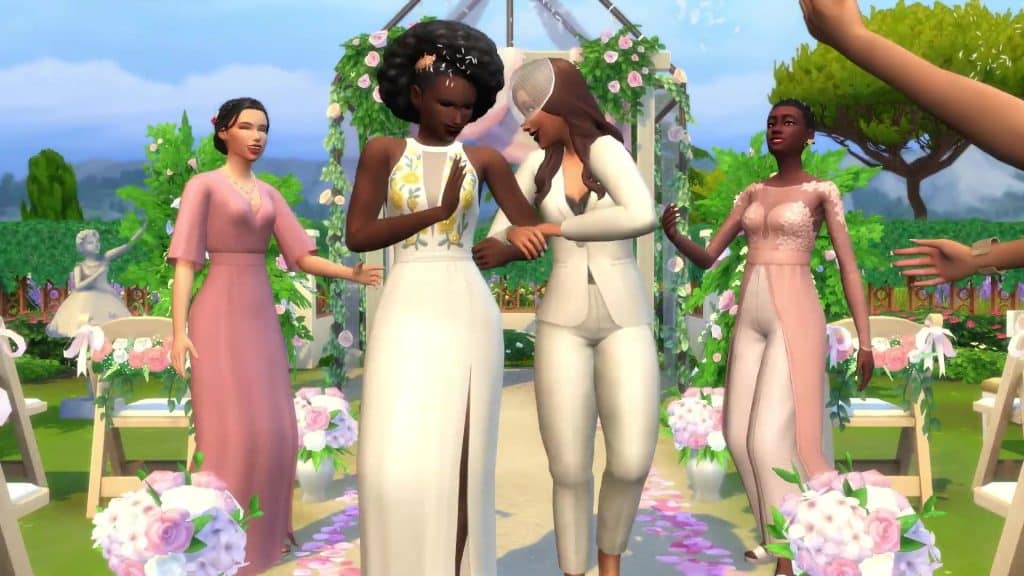
The Sims is not only a game, but a cultural touchstone for representation, one that continues to grow and evolve as society’s understanding continues. Here’s hoping that Maxis and EA don’t fold in the face of the rising right-wing that consistently attempts to silence and destroy communities. To all the grifters, bigots, and TERFs – this franchise has demonstrated the power of community even in the face of oppression and misunderstanding. This is not a space for you.
We want to wish a happy pride month to all the queer and ally Simmers, past, present, and future. Here’s to love and the freedom to be exactly who you are!
Happy Pride Month! Make sure to stay tuned to The Sims Community by following us on socials for all news and updates!


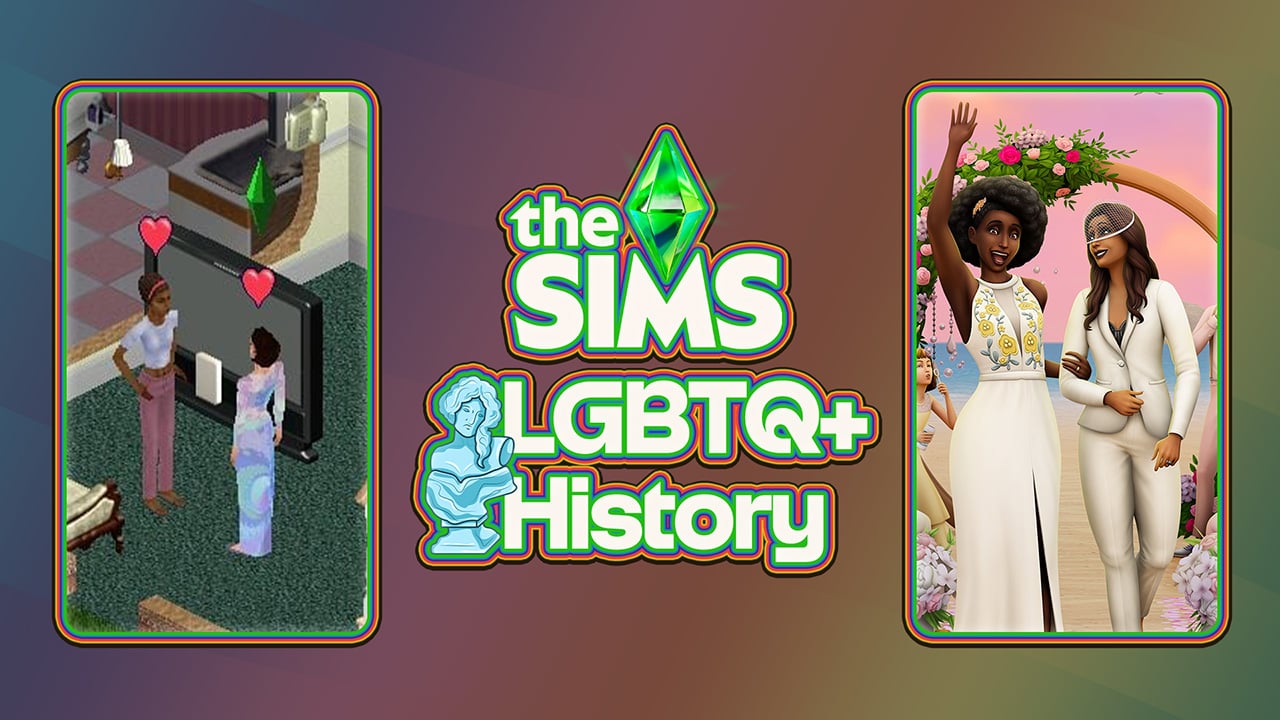
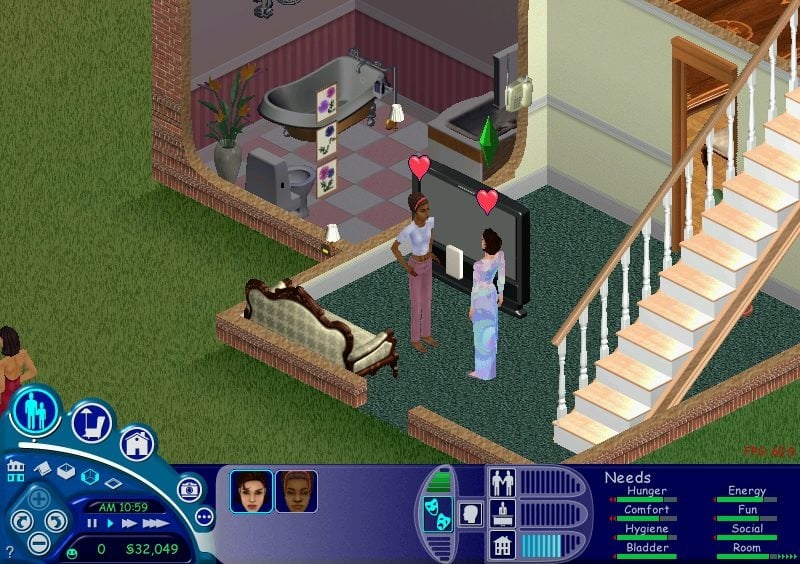
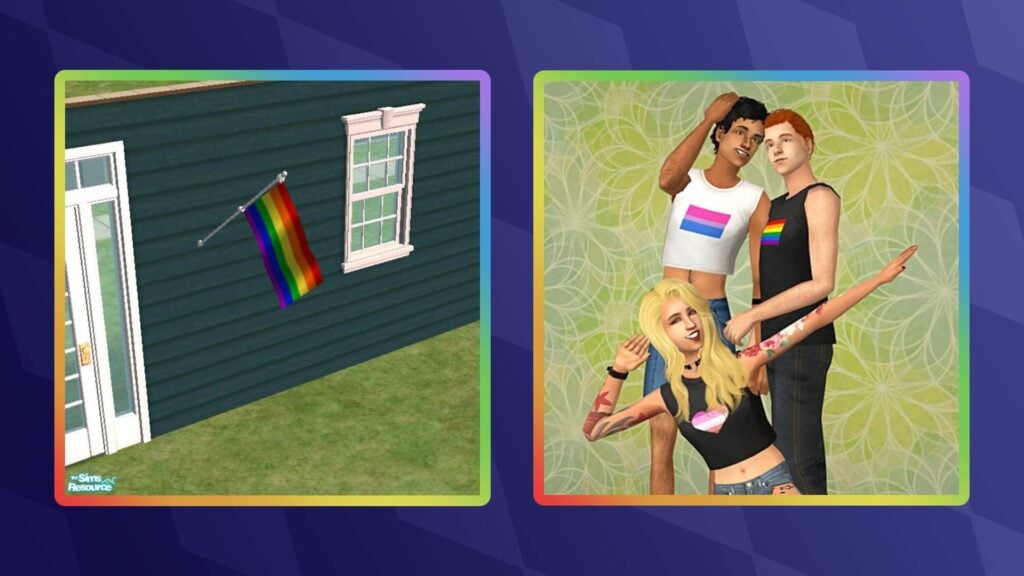
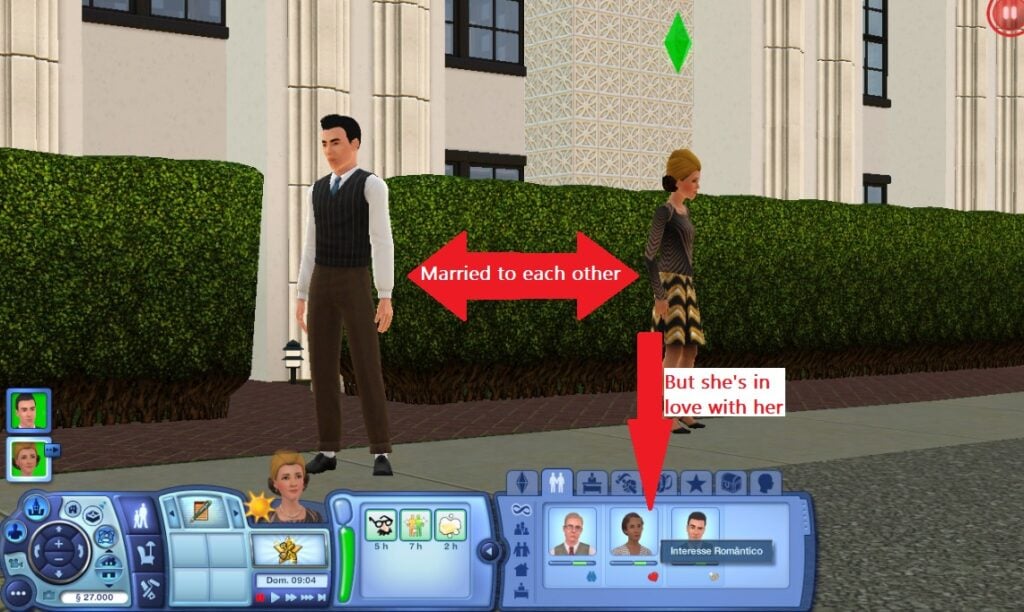
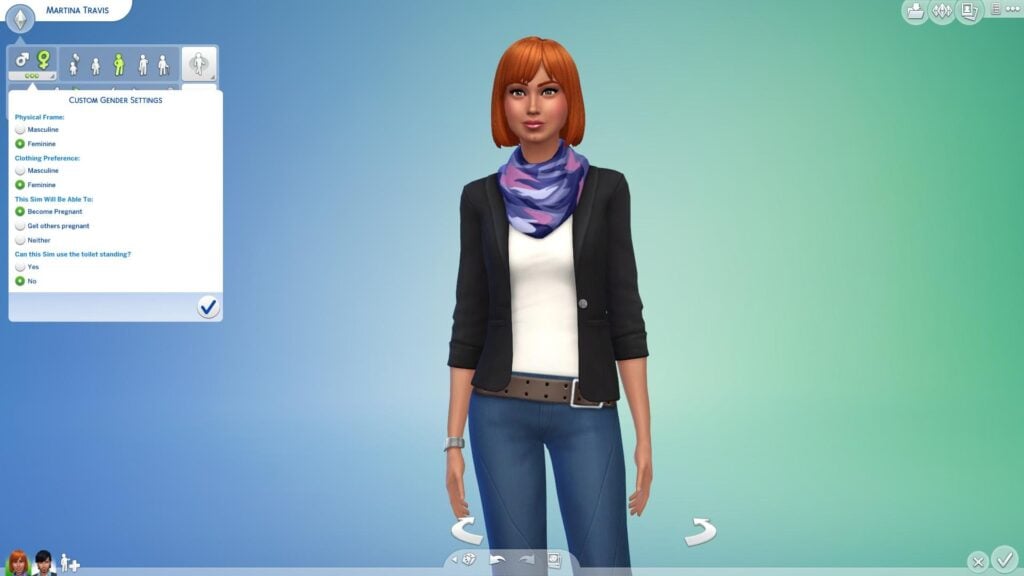

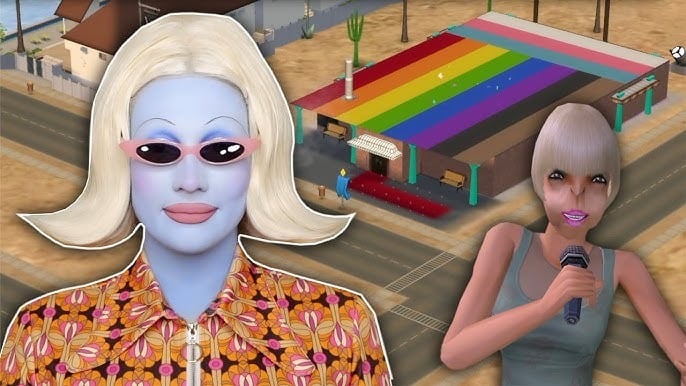
This is a beautiful article! Thank you!